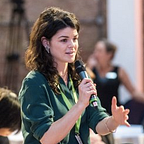Stop building a startup.
Build a product
In the first couple of weeks, you’re not building a startup. You’re building a product. Why is this an important distinction?
We have worked with more than 800 potential founders over the last six years. The mindset of building a startup is unhelpful. It leads founders to focus on the wrong things and make the wrong decisions. It prevents you from moving fast and breaking things.
The ideal mindset in the first 100 days of a startup is a product building mindset.
You’re wasting time
Startups are all about managing limited resources. This doesn’t refer to money, it refers to time. You need to move fast and will always have more work to do than time available. You must have a razor sharp focus to get the right stuff done at the right time.
Founders with a ‘startup mindset’ get distracted by actions that build a ‘startup’. For example, getting business cards printed, designing a logo, creating a product that can scale to thousands of users, finding a lawyer, talking to investors, attending networking events.
This will make you feel busy. But, when you step back, what have you built? You have built a shell of a company, a mirage of what a startup should be.
In the first weeks of a startup, you need to have a product mindset. You need to get building and testing your product with customers. The goal is to find out if you are building something people love. Unless you can start building and creating something people want, you have no startup. This is the lean mentality.
Pets.com and Webvan created the shell of a business — thousands of staff, processes, HR policies, infrastructure etc. But they missed the fundamental basis of a startup , a product that people want.
Sometimes you want to build a startup so badly, you forget what is at the core of every startup — a product that people want. The right outcome at the end of any startup process is not to have something that looks like a startup. It is to have a product that people love. It sounds so simple. It sounds like building the startup would be the hard part.
Demolish and destroy
It is a well known phenomena that people get attached to things they have. This endowment effect happens as a founder. This is more prevalent when people are in startup mindset rather than in product mindset. A startup building mindset creates baggage. Baggage weighs you down and prevents innovation and iteration.
Let’s break that down.
In startup mindset, you are building ‘assets’ that you feel some level of ownership towards. Maybe it’s a brand or logo, a name, a reputation and maybe a product. This ownership becomes a burden.
In early stage startups, creative destruction is necessary.
You have to scrap what you have created to build something better. Creative destruction is less painful and more possible when there is less at stake. If you have the product building mindset, all you have at stake is the product you have been building. It’s still painful to iterate, but it’s significantly less painful than destroying the many assets connected to ‘your startup’.
It’s not easy
At Entrepreneur First, we have seen many early stage founders struggle to get this mindset right. Remember that time is your most valuable asset. Think product first, startup second.
